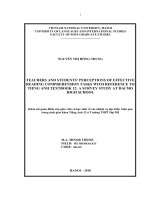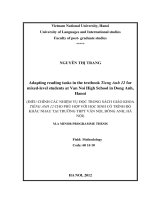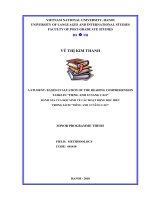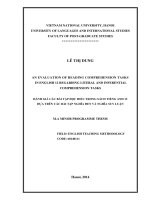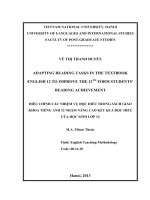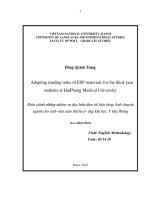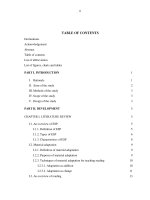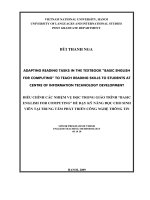Adapting reading tasks in the textbook English 12 to improve 12th form students’ reading achievement = Điều chỉnh các nhiệm vụ đọc hiểu trong sách giáo khoa tiế
Bạn đang xem bản rút gọn của tài liệu. Xem và tải ngay bản đầy đủ của tài liệu tại đây (1023.46 KB, 80 trang )
VIETNAM NATIONAL UNIVERSITY, HANOI
UNIVERSITY OF LANGUAGES AND INTERNATIONAL STUDIES
FACULTY OF POST-GRADUATE STUDIES
***************
VŨ THỊ THANH HUYỀN
ADAPTING READING TASKS IN THE TEXTBOOK
ENGLISH 12 TO IMPROVE THE 12
TH
FORM STUDENTS’
READING ACHIEVEMENT
ĐIỀU CHỈNH CÁC NHIỆM VỤ ĐỌC HIỂU TRONG SÁCH GIÁO
KHOA TIẾNG ANH 12 NHẰM NÂNG CAO KẾT QUẢ ĐỌC HIỂU
CỦA HỌC SINH LỚP 12
M.A. Minor Thesis
Field: English Teaching Methodology
Code: 60.14.10
Hanoi, 2013
VIETNAM NATIONAL UNIVERSITY, HANOI
UNIVERSITY OF LANGUAGES AND INTERNATIONAL STUDIES
FACULTY OF POST-GRADUATE STUDIES
*****************
VŨ THỊ THANH HUYỀN
ADAPTING READING TASKS IN THE TEXTBOOK
ENGLISH 12 TO IMPROVE THE 12
TH
FORM STUDENTS’
READING ACHIEVEMENT
ĐIỀU CHỈNH CÁC NHIỆM VỤ ĐỌC HIỂU TRONG SÁCH GIÁO
KHOA TIẾNG ANH 12 NHẰM NÂNG CAO KẾT QUẢ ĐỌC HIỂU
CỦA HỌC SINH LỚP 12
M.A. Minor Thesis
Field: English Teaching Methodology
Code: 60.14.10
Supervisor: Dr. Hoàng Thị Xuân Hoa
Hanoi, 2013
i
DECLARATION
I declare that Adapting reading tasks in the textbook English 12 to improve 12th
form student reading achievement is my own work, that it has not been
submitted before for any degree or examination in any other university,
and that all the sources I have used or quoted have been indicated and
acknowledged by means of complete references.
Hanoi, September, 2013
Signature
Vu Thi Thanh Huyen
ii
ACKNOWLEDGEMENTS
There have been many helping hands along the way and I wish to thank
all of them, who have always supported and encouraged me in different but
equally important ways in accomplishing this research.
First of all, I would like to express my sincere and deep gratitude to my
supervisor, Dr. Hoang Thi Xuan Hoa, for her precious lectures and invaluable
guidance which helps me to write this research with less difficulty. Without
her helpful suggestions, I could never have finished my writing.
My sincere thanks also go to all lectures and staff of Postgraduate
studies for their valuable lessons and precious helps. Thanks to their lessons
as well as needed helps, I could overcome enormous obstacles when doing
this research.
Besides, I am also grateful to Mrs. Le Thu Ha- the librarian, and all the
library staff at the post graduate studies library of ULIS, VNU.
I would like to gratefully acknowledge the support that I received from
my colleagues and students, especially students of group 12A1 at Kim Bang
A high school, who have inspired and guided me in the accomplishment of
the study.
Finally, special thanks are also due to my family and my friends for
their support in bringing this research to a success.
iii
ABSTRACT
In learning a language, students show their different needs as well as
different language proficiency. Therefore, materials adaptation can be
considered as a very important step in language teaching and learning in
general and teaching English reading skill in particular so students will
understand the content of reading materials with less frustration.
The study aims at investigating students’ opinions about reading tasks
in the textbook English 12. Based on students’ opinions about reading tasks,
the teacher attempts to find how to adapt them. Then the teacher applied those
adapted tasks in teaching English in the classroom to help students of group
12A1 of Kim Bang A high school have more chances to practice reading and
improve their reading achievement. .
The results indicated that most of the adapted tasks were suitable to
students and helped them improve reading achievement slightly. Briefly, the
study suggests some adapted reading activities and tasks for teachers to utilize
to increase the effectiveness of English reading lessons when applied to the
textbook English 12 to teach the 12
th
form students at Kim Bang A high
school.
iv
LIST OF TABLES
Table 1: Students’ opinions about reading skill and reading lessons
Table 2: The students’ factors affecting their reading comprehension
Table 3: The students’ evaluation on reading tasks in the textbook
Table 4: The students’ most frequent habit of doing reading tasks
Table 5: Students’ preference on types of reading tasks
Table 6: Students’ improvement in their reading achievement
ABBREVIATIONS
T: The teacher
Ss: Students
v
TABLE OF CONTENTS
Acknowledgements
Abstract
List of tables and abbreviations
PART I: INTRODUCTION
1. Statement of the problem and rationale of the study
2. Aims of the study
3. Research Questions
4. Significance of the study
5. Research methodology
6. Scope of the study
7. Design of the study
PART II: DEVELOPMENT
CHAPTER 1 : LITERATURE REVIEW
1.1. Reading and teaching reading skill
1.1.1. Definitions of reading
1.1.2. The importance of teaching and learning reading skill
1.2. Reading tasks
1.2.1. Defining task and task-based language teaching and learning
1.2.2. Defining reading tasks and types of reading tasks
1.2.3. Characteristics of reading tasks
1.3. Task adaptation
1.3.1. Definitions of adaptation
ii
iii
iv
1
1
2
2
2
3
3
4
5
5
5
5
6
7
7
9
10
11
11
vi
1.3.2. Reasons for adapting tasks
1.3.3. Techniques for task adaptation
1.4. Related studies
1.5. Summary
CHAPTER 2: METHODOLOGY
2.1. Research context
2.2. Reading tasks in the textbook English 12
2.3. Research Approach
2.4. Participants
2.5. Data Collection Instruments
2.5.1 Questionnaires
2.5.2. Pre-test and post-test
2.5.3. Diaries
2.6. Research procedure
2.7. Data collection procedure
2.8. Data analysis procedure
2.9. Summary
CHAPTER 3 : RESEARCH FINDINGS AND DISCUSSION
3.1. Preliminary investigation
3.1.1. Students’ opinions about reading skill
3.1.2. Students’ opinions about reading tasks
3.2. Evaluation
3.2.1. Students’ awareness of task adaptation
3.2.2. Students’ improvement in their reading achievement
12
13
14
15
16
16
17
18
20
20
20
21
22
22
24
25
26
28
28
28
29
33
33
35
vii
3.3. Summary
PART III : CONCLUSION
1. Summary of the main findings
2. Suggestions for adapting reading tasks
3. Limitations and recommendations for further research
REFERENCES
APPENDICES:
Appendix 1a: Questionnaire for students
Appendix 1b: Questionnaire (Vietnamese version)
Appendix 2: Pre-test
Appendix 3: Post-test
Appendix 4: Samples of students’ diaries
Appendix 5: Samples of adapted while reading tasks
36
37
37
37
40
41
I
I
V
IX
XI
XIII
XVI
1
PART I: INTRODUCTION
1. Statement of the problem and rationale of the study
In recent years, there has been a dramatic increase in the use of commercially
produced foreign language textbooks or coursebooks as core teaching
materials in young learner classrooms. In many cases, the approaches taken,
the methods advocated and the tasks given in these materials are unsuitable to
certain language learning and teaching context. Therefore, there is a huge risk
of not doing what is best to promote learning. In my own teaching context,
the similar problem also occurs. Thus, to promote language learning and
teaching, adapting textbooks in general, adapting tasks given those ones is
very important.
Reading comprehension can be considered the first step in acquiring
English in Vietnam. Among the four skills, reading is often taught with less
focus, less innovation. That means teachers base on the text, ask students do
some tasks provided and correct them. This method of teaching derives from
many reading problems including “insufficient sight vocabulary”, “inadequate
visual analysis skills”, “inability to use context clues” and “inadequate
comprehension skills” (Edwards, 1976). For all those obstacles, they pay less
attention to reading skill and also get less motivation in learning this skill.
Therefore, the importance of having appropriate reading tasks to students’
level is becoming increasingly recognized.
According to Harmer (1998:68), it is very important to teach reading
to students because “some of the language sticks in their mind as part of the
process of language acquisition, and if the reading is especially interesting and
2
engaging, acquisition is likely to be even more successful”. To students in the
author’s context whose English proficiency is so low, the textbook English 12
is quite challenging to them. In reading lessons, they always find it difficult to
cope with tasks which help them comprehend the given texts. It is both the
roles of teaching reading and my students’ difficulties that inspire the
researcher to do this study “adapting reading tasks in the textbook English 12 to
improve 12th form student reading achievement”.
2. Aims of the study
This minor action research was designed to help 12
th
form students work
harder on reading texts, get more reading comprehension and improve their
reading skill through the adaptation of reading tasks in the textbook English
12. From the study, recommendations on how to encourage students to read
effectively can be drawn out.
3. Research Questions
In order to get the aim of helping 12
th
form students improve their reading
achievement, the study tried to answer the following questions.
1. What are students’ opinions about reading tasks in the textbook English 12 based
on the reading lessons they have learnt in class?
2. To what extent do the adapted while reading tasks help the students improve their
reading achievement?
3
4. Significance of the study
This study was believed to be useful for the researcher because she could find
out an effective way to make her teaching process more easily. Moreover,
students of class 12A1 also got benefits from the research. They were
motivated in learning reading skill so that their reading achievement could be
improved.
5. Research methodology
This minor thesis employed Action Research in order to gain its aims because
according to Tsui (1993:33) “action research is a very effective way of helping
teachers to reflect on their teaching and to come up with their own alternatives to
improve their practice”. The author’s desire is to measure the difference in the
students’ reading achievement before and after the adaptation of the tasks in
while-reading parts in the new textbook English 12 so after identifying the
difficulties raised in the process of teaching reading lessons, the researcher
took intervention by delivering reading lessons with adapted tasks. The data
was collected via a number of instruments including a questionnaire, a
pre-test, a post-test, teacher’s diaries and students’ journals. The data was
analysed and discussed so that reliable findings could be clarified.
6. Scope of the study
This thesis was carried not to cover all kinds of materials adaptation because
this is a board aspect investigated by many authors. The author’s attempt was
only to adapt some difficult while reading tasks in the textbook English 12 to
4
reduce student’s difficulties and make them more interested in English
lessons, thus, improving their reading achievement. The study focused on one
class of grade 12 students so the results of the study could not be applied for
all students at Kim Bang A high school. The research was carried out during
the second semester of the school year at class 12A1.
7. Design of the study
The thesis consists of three parts:
Part I: Introduction: introduces the rationale, aims, research questions,
significance, scope and methodology of the study.
Part II: Development: includes three chapters:
Chapter1: Literature review: provides a theoretical basis for issues
relating to reading tasks and the adaptation of reading tasks in the textbook
English 12.
Chapter 2: Methodology: Includes an overview of the approach used on
conducting the study. It also provides a thorough description of the data
collection procedure as well as the analytical procedure.
Chapter 3: Results and Discussion: reports the findings of the real
situation of learning English of students at Kim Bang A high school.
Part III: Conclusion: summarizes the study, recommends for improvements
and acknowledges the limitations of the study.
5
PART II: DEVELOPMENT
CHAPTER 1: LITERATURE REVIEW
1.1. Reading and teaching reading skill
1.1.1. Definitions of reading
Reading has been investigated by linguists, psychologists, educators and
second language researchers, but an exact definition of reading really causes
much confusion because different authors define the terms in different ways.
In this thesis the author would like to mention some definitions of reading
extracted from different sources on the theme.
To give the definition, William (1984: 4), Nuttall (1996: 3), and Frank
(1985:104) share the same view that reading accounts for understanding what
has been written. Also, Goodman (1971 cited in Ha, 2003:6), states that
“reading is psycholinguistic process by which the reader, language user,
reconstructs, as best as he can, a message which has been encoded by writer as a
graphic display.”
Ur’s simple definition is “reading means reading and understanding” (Ur,
1996: 138). Harmer (1989: 190) seems to be interested in the notion of
reading. He argues “reading is an exercise dominated by the eyes and the brain.
The eyes receive message and the brain then has to work out the significance of the
message.”
It is clear that no definition can possibly capture all the ideas and
features of what reading is. However, what they all share is that they try to
find out the nature of reading, and reading act, in which the readers, reading
process, and reading message are emphasized.
6
1.1.2. The importance of teaching and learning reading
Many researches in applied linguistics and reading research consistently show
a strong correlation between reading proficiency and academic success at all
ages, from the primary school right through to university level: students who
read a lot and who understand what they read usually attain good grades. In
other words, a student who is a good reader is more likely to do well in school
and pass exams more than a weak reader-student. In fact, the relationship
between reading and learning begins even earlier in the pre-primary school
years. Children who are exposed to the storybook reading before they go to
school tend to have larger vocabularies, greater general knowledge and better
conceptual development than their peers. Moreover, several teachers and
researchers argue that reading is probably the most important skill for second
language student in academic or learning context.
In a second language classroom, reading plays a significant role in building
both linguistic and background knowledge for other language skills. Hoang et
al. (2006:191) even consider reading as the most effective means of
improving students’ language competence. Particularly, when there is a lack
of language environment, reading is even more significant since it helps
enlarge students’ background knowledge and vocabulary as well as supports
other skills (Pham, 2005 cited in Hoang et al., 2005:515). In short, teaching
and learning reading are very significant in the context of second language
teaching and learning in Vietnam.
7
1.2. Reading tasks
1.2.1. Defining task and task-based language teaching and learning
Applied since 1980s, task-based language teaching is a communicative
approach to language instruction, using the successful completion of
communicative tasks as its primary organizing principle. In task-based
teaching, learners will upgrade their language competence by focusing on
getting something done during using of the language. Moreover, learners are
encouraged to use whatever language they already have in the process of
completing a task. The use of tasks will also give a clear and purposeful
context for the teaching and learning a language.
According to Candlin (1987:3), “task-based learning continues with and
develops recent attention to learner-centered approaches, and in particular the
ideas of differentiation and learner interdependence”. While Bowen (2000)
focuses on the genuine purpose of task-based learning. It means that
communication should take place and that when preparing the report for the
class, students should consider language form in general rather than
concentration on a single form as in “Presentation-Practice-Production” model
of language teaching. The aim is to integrate all four skills and to move from
fluency to accuracy plus fluency.
It is obvious that task- based approach focuses on communication with
real situation and employ tasks as the main means of teaching and learning.
Numerous competing definitions of tasks exist. Many of these definitions
focus on different aspects of what constitutes a task. One of the most widely
quoted definitions for task is offered by Long (1985:89). He refers to a task as
